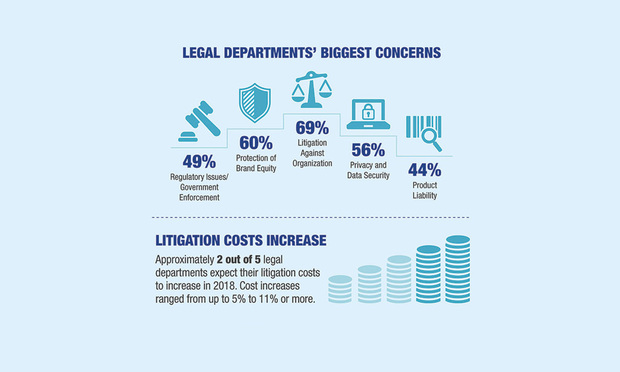MoFo Study Shows Litigation Top Concern for Consumer Products Orgs
Litigation exposure was followed by protection of brand equity and privacy and data security.
April 26, 2018 at 03:22 PM
3 minute read
 Courtesy of Morrison & Foerster
Courtesy of Morrison & Foerster Litigation exposure is among the biggest concerns for consumer products companies, according to a new report from Morrison & Foerster.
The law firm's survey, Legal Risks to Consumer Products Companies in 2018, looked at the concerns that matter to companies that manufacture electronic devices, snacks, apparel and other products.
The survey queried 60 consumer product companies in the United States with revenues ranging from $250 million to $1 billion—which Morrison & Foerster says constitutes a fifth of the total U.S. consumer products companies of that size.
Some 69 percent of the in-house counsel respondents indicated that litigation is their top concern. Protection of brand equity came in behind litigation at 60 percent, followed by privacy and data security at 56 percent.
“Consumer products companies have always faced unique legal challenges, but in-house counsel are now under more pressure than ever to protect their brand and keep their consumers' trust,” said Erin Bosman, chair of Morrison & Foerster's products liability and counseling practice, in a press release announcing the survey.
“Our survey revealed that, while reputation and litigation threats continue to grow, advancing technology like the Internet of Things has created an even more complex legal landscape that will force companies to anticipate and plan for previously unknown risks,” she added.
On the litigation front, two out of five legal departments anticipate higher litigation costs in 2018. The increase could range from 5 to 11 percent, respondents said. On top of costs, about 20 percent of legal departments expect more high-risk lawsuits this year. The in-house counsel surveyed expect suits could focus on product liability (45 percent), data privacy (44 percent) and regulatory and compliance matters (42 percent).
Respondents also indicated the most important drivers of change for their companies would be the economy (78 percent), government regulatory change (71 percent) and technological advancements (59 percent).
The survey spoke to the “expanding list of regulatory agencies” that ”will test the existing legal framework and force companies to anticipate and plan for previously unknown risks.”
“While the current federal government is unlikely to add regulations, state and local governments are taking a different approach and could implement changes on everything from climate change and nutrition to privacy and labor laws,” Julie Park, a partner in the producta liability and counseling practice, said in the press release.
Though the tide may be turning away from federal regulation, respondents were also asked to identify which agencies would be most relevant to their organizations. At the top of the list was the Federal Trade Commission, cited by 45 percent of respondents, followed by the U.S. Consumer Product Safety Commission at 36 percent and the U.S. Securities and Exchange Commission at 24 percent.
This content has been archived. It is available through our partners, LexisNexis® and Bloomberg Law.
To view this content, please continue to their sites.
Not a Lexis Subscriber?
Subscribe Now
Not a Bloomberg Law Subscriber?
Subscribe Now
NOT FOR REPRINT
© 2025 ALM Global, LLC, All Rights Reserved. Request academic re-use from www.copyright.com. All other uses, submit a request to [email protected]. For more information visit Asset & Logo Licensing.
You Might Like
View All
Netflix Music Guru Becomes First GC of Startup Helping Independent Artists Monetize Catalogs
2 minute read

Global Software Firm Trying to Jump-Start Growth Hands CLO Post to 3-Time Legal Chief

Supreme Court Reinstates Corporate Disclosure Law Pending Challenge
Trending Stories
- 1No Two Wildfires Alike: Lawyers Take Different Legal Strategies in California
- 2Poop-Themed Dog Toy OK as Parody, but Still Tarnished Jack Daniel’s Brand, Court Says
- 3Meet the New President of NY's Association of Trial Court Jurists
- 4Lawyers' Phones Are Ringing: What Should Employers Do If ICE Raids Their Business?
- 5Freshfields Hires Ex-SEC Corporate Finance Director in Silicon Valley
Who Got The Work
J. Brugh Lower of Gibbons has entered an appearance for industrial equipment supplier Devco Corporation in a pending trademark infringement lawsuit. The suit, accusing the defendant of selling knock-off Graco products, was filed Dec. 18 in New Jersey District Court by Rivkin Radler on behalf of Graco Inc. and Graco Minnesota. The case, assigned to U.S. District Judge Zahid N. Quraishi, is 3:24-cv-11294, Graco Inc. et al v. Devco Corporation.
Who Got The Work
Rebecca Maller-Stein and Kent A. Yalowitz of Arnold & Porter Kaye Scholer have entered their appearances for Hanaco Venture Capital and its executives, Lior Prosor and David Frankel, in a pending securities lawsuit. The action, filed on Dec. 24 in New York Southern District Court by Zell, Aron & Co. on behalf of Goldeneye Advisors, accuses the defendants of negligently and fraudulently managing the plaintiff's $1 million investment. The case, assigned to U.S. District Judge Vernon S. Broderick, is 1:24-cv-09918, Goldeneye Advisors, LLC v. Hanaco Venture Capital, Ltd. et al.
Who Got The Work
Attorneys from A&O Shearman has stepped in as defense counsel for Toronto-Dominion Bank and other defendants in a pending securities class action. The suit, filed Dec. 11 in New York Southern District Court by Bleichmar Fonti & Auld, accuses the defendants of concealing the bank's 'pervasive' deficiencies in regards to its compliance with the Bank Secrecy Act and the quality of its anti-money laundering controls. The case, assigned to U.S. District Judge Arun Subramanian, is 1:24-cv-09445, Gonzalez v. The Toronto-Dominion Bank et al.
Who Got The Work
Crown Castle International, a Pennsylvania company providing shared communications infrastructure, has turned to Luke D. Wolf of Gordon Rees Scully Mansukhani to fend off a pending breach-of-contract lawsuit. The court action, filed Nov. 25 in Michigan Eastern District Court by Hooper Hathaway PC on behalf of The Town Residences LLC, accuses Crown Castle of failing to transfer approximately $30,000 in utility payments from T-Mobile in breach of a roof-top lease and assignment agreement. The case, assigned to U.S. District Judge Susan K. Declercq, is 2:24-cv-13131, The Town Residences LLC v. T-Mobile US, Inc. et al.
Who Got The Work
Wilfred P. Coronato and Daniel M. Schwartz of McCarter & English have stepped in as defense counsel to Electrolux Home Products Inc. in a pending product liability lawsuit. The court action, filed Nov. 26 in New York Eastern District Court by Poulos Lopiccolo PC and Nagel Rice LLP on behalf of David Stern, alleges that the defendant's refrigerators’ drawers and shelving repeatedly break and fall apart within months after purchase. The case, assigned to U.S. District Judge Joan M. Azrack, is 2:24-cv-08204, Stern v. Electrolux Home Products, Inc.
Featured Firms
Law Offices of Gary Martin Hays & Associates, P.C.
(470) 294-1674
Law Offices of Mark E. Salomone
(857) 444-6468
Smith & Hassler
(713) 739-1250






